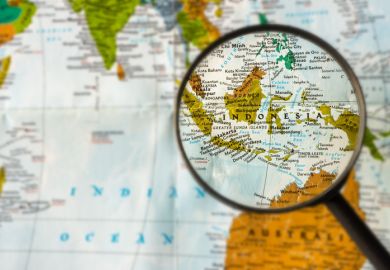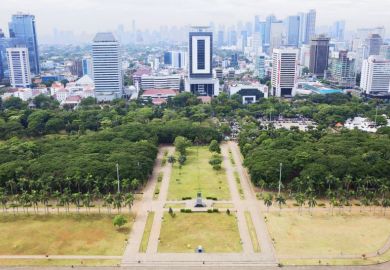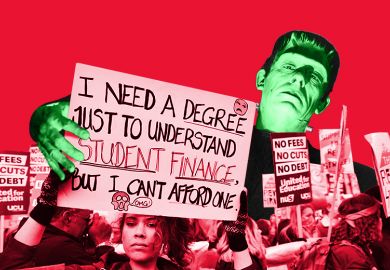Indonesia’s student journalists are demanding the same protection as their professional colleagues, after a report documented their exposure to litigation, gagging, expulsion and violence.
Media and human rights groups are campaigning for student media organisations to be legally recognised as independent outlets so that the press freedom watchdog can arbitrate disputes with university administrators.
The Press Council mediates defamation disputes involving “legally independent media organisations”, according to the International Federation of Journalists. However, this definition excludes student media outlets, which are not deemed legally independent because universities are overseen by the education and religious affairs ministries.
The Indonesian Student Press Association (PPMI) said legality had become a “big loophole” for universities. “Attacks and threats will continue as long as the legality of the student press remains opaque,” PPMI warned.
In a report last November, PPMI documented 185 “repressions” against student journalists and media outlets in the space of 12 months. These ranged from reprimands, warnings, forced apologies and curfews to funding cuts, redactions, threats, intimidation and attacks by “thugs”.
While police, sources and fellow students were sometimes responsible, campus officials were by far the most common perpetrators, often coercing journalists not to publish stories. If coverage ensued, reprisals included censorship, defunding, violence, suspension from classes and allegations of defamation or vandalism.
The report details 10 cases of repression including arrests and threats of violence. A student media outlet in Jakarta was attacked by a mob, while an editorial office in Makassar was pelted with rocks.
In a more recent episode, student journalists at the National Islamic Religious Institute (IAIN) in Ambon were beaten and “criminalised” after their Lintas magazine published a March 2022 edition on sexual harassment and violence.
Lintas reported a seven-year history of harassment at the institution, spotlighting 32 victims and 14 suspected perpetrators – mostly lecturers. Three days later, the rector froze the magazine’s funding, claiming the outlet was “not in line” with IAIN Ambon’s “vision and mission”.
According to the PPMI report, the magazine was closed after staff refused to divulge a victim’s identity. Five journalists were reported to the police and two were allegedly beaten by family members of a senior university employee.
Lintas contested its closure in an administrative court and was supported by the Press Council. But the case was thrown out due to the magazine’s lack of legal standing, according to PPMI, which said the police case against the five journalists was pending and several reporters had been suspended from their studies.
“What happened to Lintas is very likely to happen to other [student press organisations],” PPMI warned. “When the student press seeks justice…legality will continue to be questioned.” It said student media was a “place of regeneration” for journalists and quality media.
Student journalism has a long history in Indonesia, according to Human Rights Watch (HRW). Most universities have at least one student media outlet and some as many as four, with some newspapers founded in the 1960s.
Two of the country’s founding fathers, inaugural vice-president Mohammad Hatta and prime minister Sutan Sjahrir, agitated for independence as student journalists in the Netherlands in the 1920s and founded an influential newspaper called Daulat Ra’jat.
HRW has documented other cases of repression, including the 2019 closure of a student website in Medan for publishing a fictional “lesbian love story”. Eighteen journalists were given 48 hours to vacate the newsroom. The publisher filed a lawsuit against the rector, but lost in the administrative court.
HRW said criminal defamation cases involving student journalists were handled by local police, where officers were “easily swayed by influential local elites”.
It said the Press Council should seek authority to mediate all college media disputes – as it already did in conflicts involving professional media – through negotiations with the national police and civil service.
“The Indonesian government should provide a meaningful response to student media leaders for the serious issues they have identified,” said Phil Robertson, HRW’s deputy Asia director. “Key government agencies and the Press Council should set up a task force to…protect student journalists and their publications.”
In a statement, the Press Council said it was “committed to encouraging the formation of a legal umbrella” for student media. Asmono Wikan, who chairs the council’s Information and Communication Commission, said the organisation was in talks with the Ministry of Education, Culture, Research and Technology to “find a way out”.
“We continue to communicate…so that there will soon be a joint dialogue to try to regulate the protection of student press activities,” he said, inviting input from PPMI members. But student press must “comply with journalistic principles”, the council warned.
Register to continue
Why register?
- Registration is free and only takes a moment
- Once registered, you can read 3 articles a month
- Sign up for our newsletter
Subscribe
Or subscribe for unlimited access to:
- Unlimited access to news, views, insights & reviews
- Digital editions
- Digital access to THE’s university and college rankings analysis
Already registered or a current subscriber?








